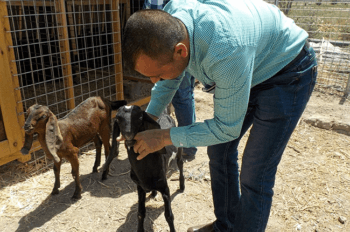AgriLife Equips Afghan Farmers With Livestock Production Tech

Over the past two years, the Norman Borlaug Institute for International Agriculture, part of Texas A&M AgriLife Research, has been working with other U.S. land-grant universities to help improve the lives and livelihoods of farmers in Afghanistan.
Through the U.S. Agency for International Development’s Afghanistan Agricultural Extension Project-II, a three-year $19.8 million project that runs through September 2017, the institutions are collaborating on an agricultural Extension program to deliver knowledge and technical assistance at a grassroots level.
According to USAID, the project’s primary objectives include helping agricultural Extension workers transfer useful information and technology to farmers, improving rural household food security and income generation, improving nutrition for farm households and enhancing agricultural services for women working in the agricultural sector.
The project, led by the University of California-Davis, includes Texas A&M, Washington State University, Purdue University and the University of Maryland.
The universities are working in conjunction with Afghanistan’s Ministry of Agriculture, Irrigation and Livestock and its provincial directorates to help deliver agricultural knowledge and technical assistance to those in rural communities, according to Dr. Tim Davis, Borlaug Institute regional director for Asia who oversees project activities by Texas A&M.
“A large part of this project is its train-the-trainer efforts in which we provide Extension workers from the ministry and its regional directorates, lead farmers, community and field farm school leaders, university professors, students and others with training on a variety of topics,” Davis said. “These people, in turn, share that information directly with the farmers.”
Davis, who recently visited project sites in Afghanistan with Borlaug Institute director Dr. Elsa Murano, College Station, said the project impacts 27 provinces and 192 districts in Afghanistan, and has already trained participants from each of those provinces and districts. There are now work groups in 11 districts, as well as train-the-trainer workshops in 44 districts. To date, 10,575 people have received training, including 2,372 women.
“Afghanistan is a country with great potential for agricultural production,” Murano said. “From grapes to apples to potatoes to sorghum to corn to goats, they can produce it all. There are great obstacles to progress, however, including a lack of transportation infrastructure as well as security issues. However, Afghan farmers are determined and grateful, very appreciative of what we are doing to help them, and willing to work hard to pursue a decent life for themselves and their families.”
Continue reading on AgriLife Today.
Media contacts:
- Dr. Tim Davis, Texas A&M College of Agriculture & Life Sciences.
- Dr. Elsa Murano, Texas A&M College of Agriculture & Life Sciences.





